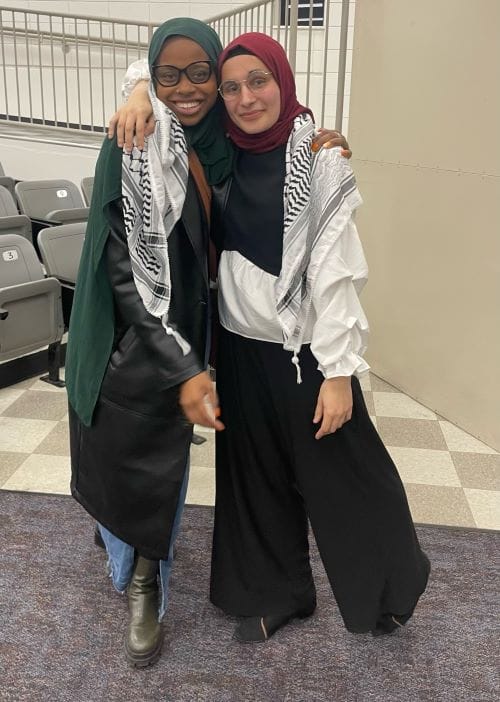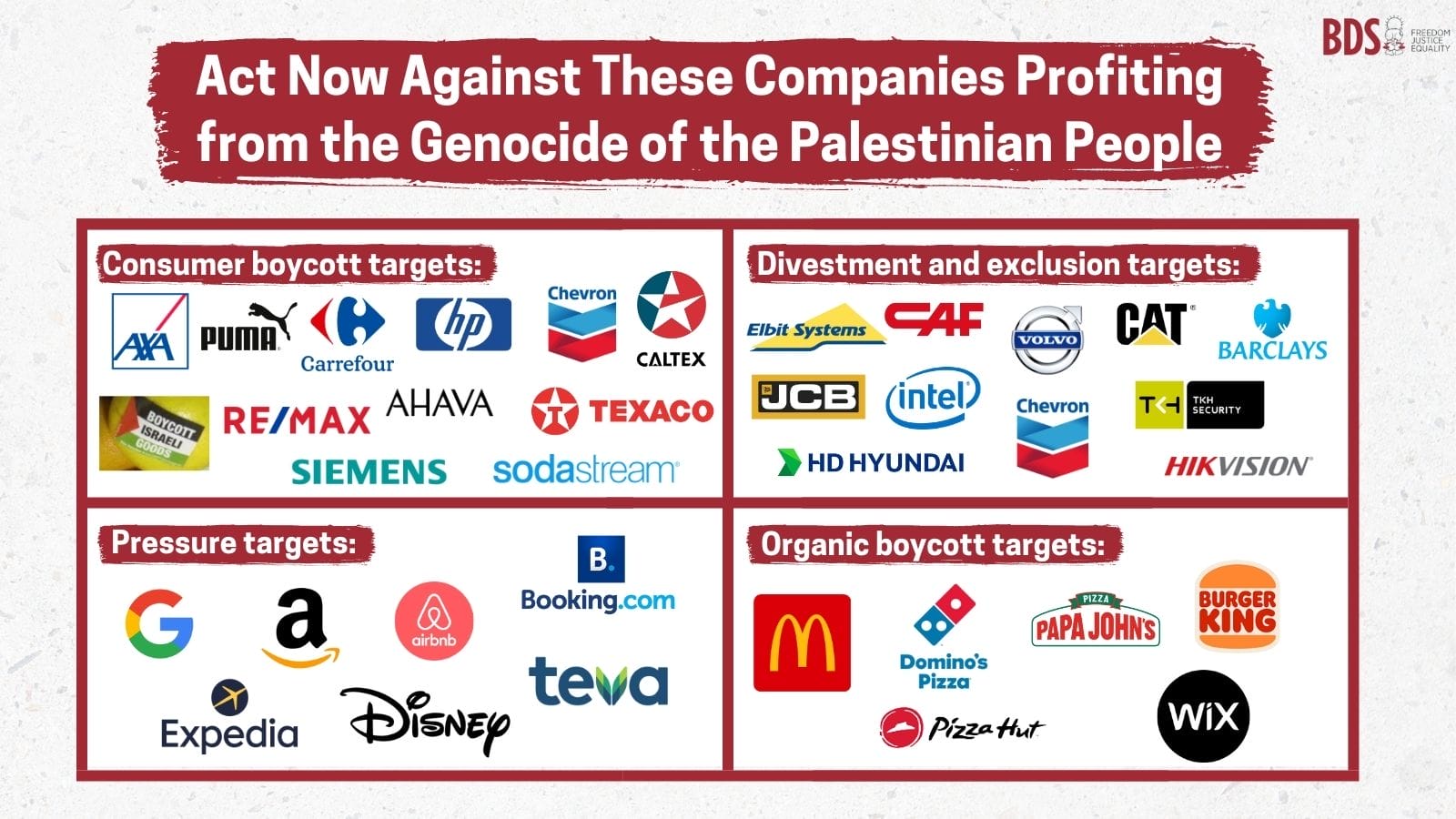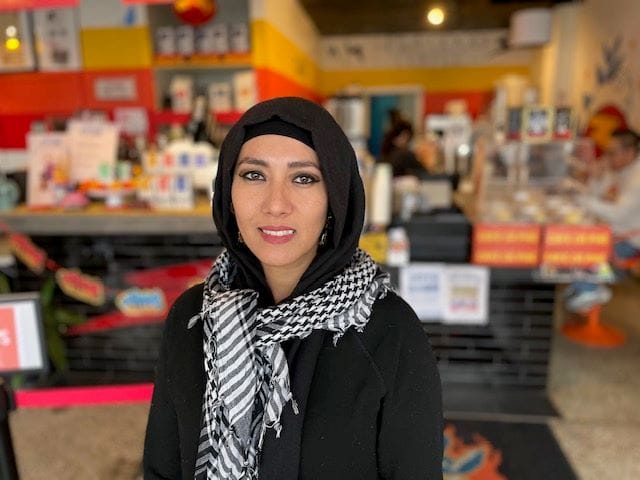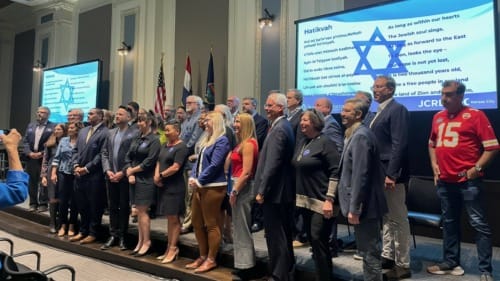Inside KC’s Boycott, Disinvestment and Sanctions Movement 'At the end of the day, we’re all human.'
Published January 11th, 2024 at 6:00 AM
Above image credit: This tribute at Mill Creek Park presses for a ceasefire to the bombings in Gaza and the deaths of Palestinian civilians. Jordan Graves carefully laid out the design of stones, rose petals and even pencils and children's socks, which were to note the deaths of children. (Mary Sanchez | Flatland)“Dehumanized.”
That’s the word that Yara Salamed used to describe what she felt at 13 years old. That’s when she went from being a Kansas City-area teenager to living in the West Bank.
It was a five-year family sojourn so that Salamed and her siblings could grow closer to relatives in the Middle East, learn Arabic and absorb their culture as Palestinian Americans.
But Salamed said she never grew used to the questioning looks, the assumptions that she was antisemitic, a terrorist or violent, solely because she was of Palestinian descent.
“I just felt dehumanized the entire time,” said Salamed, now a University of Missouri-Kansas City law student. “When I was in the West Bank, they referred to us as snakes that needed to be terminated.”
She felt that her family, and her grandparents and cousins who still live there, were considered subhuman by many Israelis.
Her experiences inform her feelings about the current bombings by Israeli forces in Gaza, the now four-month-long war, and the tremendous loss of Palestinian lives.
From Kansas City, she wanted to help, to do something non-violent, beyond a rally.
She formed the UMKC Students for Justice in Palestine and began encouraging others to join longstanding international efforts to pressure Israel through economic means.
The Boycott, Disinvestment and Sanctions (BDS) movement is Palestinian led, nearly 20 years old and patterned after similar global efforts to break the apartheid system in South Africa.

“We just want to educate people on what the BDS movement is and to encourage them to stop buying from places who support Israel financially,” Salamed said.
President Joe Biden currently has a $14.5 billion request before Congress for aid to Israel, including for air and missile defense systems. It has passed the House but is tied up in the Senate with disputes over aid to Ukraine and security at the southern border of the United States.
The BDS movement frames such military assistance as complicit in what it terms “an unfolding genocide” against Palestinians.
“Our taxes literally fund what’s going on right now,” Salamed said. “We want to put that same pressure on Israel to end the occupation and oppression and the apartheid system that they’re placing against Palestinians.”
The escalating bombings by Israel Defense Forces in their battle against Hamas has drawn new attention to the BDS movement, which is wide in scope.
It targets many household brands and services, differentiating between boycotts, divestment efforts and which firms have been singled out for other types of pressure.
McDonald’s, for example, is cited for giving free food to Israeli soldiers.
ReMax is listed for its affiliates in Israel and their involvement with Israeli settlements.
Puma is a main sponsor of the Israel Football Association, which includes teams from settlement lands.
Hewlett Packard is included for its biometric identification system that BDS argues is used to restrict the movement of Palestinians.
And Disney’s Marvel Studios drew criticism because a Captain America film “personifies apartheid Israel,” according to the BDS website.
For local BDS advocates, a plant in Lawrence — ICL, a global specialty mineral company — has also drawn scrutiny in recent weeks, with allegations that it is Israeli-owned and a supplier of white phosphorus, a chemical that can be used in detergents and fertilizers, but also in munitions.
In a written statement, the company replied: “Neither ICL nor our Lawrence, Kan., facility produces white phosphorus. The phosphates produced in Lawrence are only used in food production and in various industrial applications. We safely manufacture and supply thousands of compounds that are used in a variety of products in hundreds of industries worldwide.”
Starbucks has also drawn criticism from local advocates. They believe the company disciplines U.S. employees for pro-Palestinian views.
Salamed said that McDonald’s wasn’t a go-to spot for herself and many of the college-aged people who are active in local actions. Many of her peers would rather support local coffee shops, especially those that are known as allies to calls for Palestinian rights.
Such strategic placement of dollars, combined with public pressure via statements, is the heart of the BDS movement.
State Laws Ban BDS Actions
Both Kansas and Missouri have laws against the BDS movement’s efforts to target Israel, which has long been considered a valuable strategic military ally and trade partner to the U.S.
Anti-BDS laws, passed in nearly 40 states, are intended to stop companies with state contracts from participating in boycotts, sanctions or disinvestments.
Kansas and Missouri passed their laws within the last six years.
The Kansas legislation, approved in 2017, stated, “Congress has concluded as a matter of national trade policy that cooperation with Israel materially benefits United States companies and improves American competitiveness.”
Kansas was included in a successful First Amendment challenge that argued such laws undercut First Amendment rights.
In response, Kansas changed its law, limiting companies that are affected to those with 10 or more employees and contracts above $100,000. Such firms must certify that they are not currently involved in a boycott as they enter a state contract.
Missouri passed its law in 2020.
In 2022, Kansas exported $36.5 million to Israel in goods and services. Missouri’s total was $131 million according to reporting by the Wichita Beacon, citing firms listed in the Jewish Virtual Library.
But the BDS movement draws pushback beyond politics, including from the companies targeted.
McDonald’s, which operates in many predominantly Muslim countries, had not previously been a BDS-named company until recently.
But it was added this month, and McDonald’s Malaysia, sued the Malaysia BDS organization for $1.3 million, charging that it had been targeted by “false and defamatory statements,” according to the BBC.
And an executive for McDonald’s acknowledged that the boycotts had affected the restaurant’s business in several Middle East markets.
BDS Targets

Salamed echoed other local activists, stressing that organizers here are careful to differentiate between statements they feel are anti-Zionist as opposed to antisemitism, taking steps to avoid the later.
“We wouldn’t support anyone who expressed any sort of commentary or action against Jews in the name of Palestine because that’s not what this is about,” she said.
Organizations like the American Jewish Committee offer warnings:
“BDS markets itself as a non-violent movement to boycott, divest from, and sanction Israel to get it to withdraw to its pre-1967 borders,” the AJC wrote in a statement posted online. “While many rank-and-file members of the movement sincerely want peace and are lured in by this human rights façade, BDS leadership in fact seeks nothing less than the elimination of Israel as a Jewish state.”
Also, the Jerusalem Institute of Justice has a publication available online titled, “We Seek To Uncover The Lies And Reveal The Truth About The BDS Movement.”
The AJC also has addressed the movement at length in online postings.
Salamed, other local advocates, aren’t deterred.
Tabling events, basically sitting in a designated spot and handing out flyers, have been held on the UMKC campus. Social media is also a leading organizing tool, through Instagram accounts such as @BDSKansasCity and @AlHadafKC.
Billboards also have been posted around town, pressing for a ceasefire and quoting the late South African leader Nelson Mandela, “Our freedom is incomplete without the freedom of the Palestinians.”
U.S. taxpayer funding to Israel, whether through federal contacts or a state, is a common topic at the many local rallies that have been held since Hamas attacked Israel on Oct. 7, murdering at least 1,200 people and taking more than 200 Israelis hostage.
In response, the Israeli military has vowed to destroy Hamas, which the U.S. sees as a terrorist organization. More than 22,000 Palestinians so far are dead, many of them children.
‘It Used to Be Just Us’
Samantha Salem stared at her smartphone, scrolling through the images her father was sending.
A minute prior she was helping lead a discussion on the BDS movement. The meeting, one of several that Salem has organized at area businesses, was held at a coffee shop east of the River Market.
More than a dozen people gathered Saturday at Cafe Cà Phê, a Vietnamese-owned shop that is considered an ally to Palestinian views of the current war.
“A lot of people are waking up now,” Salem said, noting that many of the people were not of Palestinian descent. “It used to be just us.”

The photos her father sent included what was once the family home, the street that she walked countless times as a teenager.
It’s all rubble now.
Until mid-November, Salem’s father, a U.S. citizen, was trapped in Gaza. He had moved there in 2020. Salem is relieved to finally have her father with the rest of the family in the Greater Kansas City area.
It took weeks of negotiating, filing paperwork with the U.S. State Department and tapping the help of area congressional leaders. U.S. Sen. Eric Schmitt of Missouri was especially responsive and helpful, she said, helping to get her father’s interview moved from the U.S. embassy in Jerusalem to Cairo.
The stress was overwhelming. There were times when she couldn’t reach him by phone. She didn’t know if that meant that he was sleeping, in danger, or out combing the streets trying to find food or drinkable water.
Now that he and her stepmother are safe, she’s turned to helping others understand the BDS movement.
“I can’t sit here and have my electricity, my DoorDash and do nothing,” she said.
Boycotting companies can limit profits, she said. That can affect how much money a firm can donate to politicians who are supportive of Israeli bombings of Palestinians, she said.
“It can end up a basic supply and demand issue where we only support businesses that are ethical, that are transparent with political affiliations and financial support,” Salem said.
There are various levels of the BDS movement.
Others see the BDS movement as an alternative to violent resistance.
Kaitlin Roberts was married to a Palestinian man and converted to Islam while a college student.
She questions the laws that ban BDS activity.
“Why when freedom of speech is a fundamental right?” she asks.
She sees the BDS movement as a peaceful, moral option.
“There is so much nuance, so many differing views,” Roberts said. “But it’s crazy that our liberal political leaders are siding with a foreign government.”
And while the group said that they wanted to “give grace” to people who don’t know much about the bombings in Gaza and U.S. funding to Israel, at this point that feels to them like an assertion of privilege, a blind negligence, a choice.
“People don’t know where to start,” Roberts said. “But there is just so much effort to keep Palestinians from getting their rights.”
Repeatedly, proponents point to the eventual success of the anti-apartheid movement in South Africa as a model for hope.
South Africa has brought an accusation of genocide on Israel through the United Nations Genocide Convention, a charge against which Israel is expected to begin defending itself this week.
The convention was initiated after the Holocaust, when Nazi Germany orchestrated the murder of 6 million Jewish people.
Israel, according to reporting by CNN, will plead self-defense before the UN convention and that it has tried to limit civilian casualties among Palestinians.
Charges like South Africa has made would ring hollow through much of the Kansas Legislature, which is standing firmly with Israel’s right to defend itself.
Rep. Stephen Owens, a Republican from Hesston, recently sponsored a resolution condemning the Oct. 7 attacks by Hamas and pledging Kansas’ support of Israel.
The resolution drew the condemnation of local activists for the BDS movement.
The resolution was approved in January with bipartisan support and Owens said that he “100%” stands with Israel.
“America is the greatest country in the world,” he said in an email when asked about DBS efforts. “The rights and freedoms we have are second to none. While I completely disagree with this organization’s position on this issue, I respect their right under the Constitution to share their thoughts and petition their government. However, it does nothing to change my opinion on the matter and fight back against all forms of antisemitism. I stand with Israel.”
A 2017 initiative of the American Jewish Committee called Governors United Against BDS drew support from 50 states, including former governors Eric Greitens and Jay Nixon of Missouri and Sam Brownback of Kansas.
The AJC stand then, as detailed in a YouTube statement, was that the BDS movement would make an eventual two-state solution less likely.
Responding to BDS
A young woman who attended the Saturday gathering at Cafe Cà Phê told of struggling during the Christmas holidays.
Her mother wanted to shop for family gifts, but she thought the store was on a banned list.
Helping people to navigate such tough decisions, including tensions within families, is part of Salem’s goals for gatherings at area businesses.
Initially, she watched with distress as arguments unfolded online, even among those who are in favor of the BDS movement. To what degree and what impact was often the issue debated.
The arguments and trying to explain Israeli policies affecting Palestinians can be exhausting, and self-defeating.
People can agree to disagree, she said.
“People need to remember,” Salem said, “at the end of the day, we’re all human.”
Editor’s note: This story has been updated to add a statement from ICL.
Mary Sanchez is senior reporter for Kansas City PBS.




